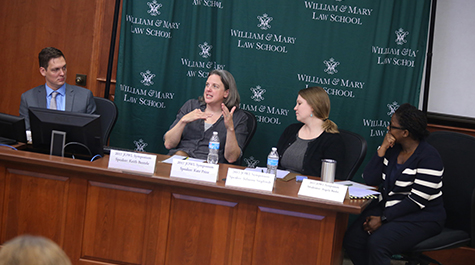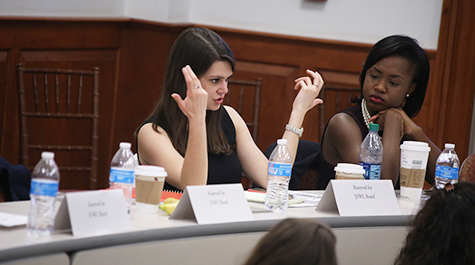Journal of Women and the Law Hosts Symposium on Combating Human Trafficking
On February 24, William & Mary Law School’s Journal of Women and the Law (JOWL) hosted a symposium on “Combating Human Trafficking Through Law and Social Policy”―the topic of the journal’s Fall 2016 special issue. The Symposium was the culmination of more than a year of planning, which began with alumna Olivia Wiggins J.D. ’16, who had pre-law school experience working with sexually exploited children at a non-profit organization in Lima, Peru, and who gained realization of how prevalent human trafficking is—even in the United States.
As Wiggins explained during planning, “Raising awareness of human trafficking, increasing our efforts to fight against it, and finding more effective ways to empower survivors...move[s] us towards a more just society, where the value of a life is not derived from what an individual can put out or provide to others.”
In opening symposium remarks, Vice Dean Laura Heymann stressed the difficult and nuanced policy decisions to be made in this area of the law. These include: how we define the victims in trafficking, particularly in sex trafficking cases; how we balance protecting victims while also respecting their autonomy in decision-making processes; and how to allocate resources to either prosecute offenders or provide services to survivors.
Throughout the day-long event, law students, undergraduates, and faculty members heard from five speakers and took part in two panel sessions with moderators Angela Banks from the Law School and Jennifer Bickham Mendez from the undergraduate campus. JOWL staff set a tone for the day of remembering the practical import of policy decisions. As advocate, author and speaker Kate Price stressed in her introduction to the special issue: “These ideas may seem theoretical on paper; however, the outcomes have real-life implications for people involved.”
Price, herself a survivor of CSEC (Commercial Sexual Exploitation of Children) spoke with her coauthor, Professor Keith Bentele (both from the University of Massachusetts, Boston) about their work studying and quantifying recent trends in anti-CSEC legislation. Grounded in the history of U.S. legislation against human trafficking, they identified the most useful precursors to enacting more comprehensive legislation at the state level today.
Throughout the discussion, Price identified practical considerations of their findings. One area of concern surrounding legislation is that many victims’ services programs are funded based on fines through persecuting offenders, but many localities shy away from formally punishing offenders, so victims’ services simply go unfunded. Students in the room listening will one day be charged with finding solutions to similar legal problems, and these events help lay the foundation of knowledge they will use to succeed.
A large part of the day’s discussion focused on a concept called “the model of innocence,” which postulates that the public at large is most sympathetic to victims of human trafficking who share certain characteristics—e.g., very young, white, female, sexually exploited, well spoken, etc. Discussions delved into the stigmas around sex trafficking because these theories may influence how policy and laws are formed. Speakers Julianne Siegfriedt, a doctoral candidate at the University of Massachusetts, Boston, and JOWL’s own Christine Anchan J.D. ’17, spoke about what happens when a sex trafficking victim turns 18: an exploited person who is a “victim” entitled to services in the eyes of the law as a minor becomes a perpetrator subject to prosecution—overnight.
Anchan contrasted this adult victim with the model of innocence by referring to her as an “imperfect victim” and stressed that “the only way to decrease exploitation and sex trafficking is to take an affirmative step to protect those who are most vulnerable: the victims.”
In the afternoon, Katie Soltis, an immigration law fellow working for Ayuda through an Equal Justice Works fellowship, spoke about her experiences advocating for victims of human trafficking for labor who face their own obstacles to achieving justice. Although statistics show that, worldwide, 4.5 million people are victims of forced sexual exploitation while 14.5 million people are victims of other forced labor, cases involving sexual exploitation are much more likely to be prosecuted. Soltis explained to the law students how the law defines being a victim of human trafficking, and recourses available to a victim of severe human trafficking. Her insight into the trends of human trafficking, especially in the wider Washington, D.C., area, and the concerns of her clients and the legal strategies available, will help student attendees who plan to work in the field of immigration law after graduation.
The speakers and students who attended the Symposium enthusiastically thanked JOWL for hosting the event.
“The JOWL symposium embodied what I'd hope I'd find in law school: a community of scholars, devoted to exploring intellectually and emotionally challenging subjects through a legal lens,” said Michaela Lieberman J.D. ’18. “I was deeply impressed by the caliber of the presenters, as well as the curiosity of my peers. The panel moderators and JOWL Executive Board helped us probe difficult issues in a way that was sensitive but not sensitized. Attending the JOWL symposium made me proud to be a member of a journal that pursues excellent scholarly work devoted to important topics, like human trafficking, that are too often overlooked.”
About William & Mary Law School
Thomas Jefferson founded William & Mary Law School in 1779 to train leaders for the new nation. Now in its third century, America's oldest law school continues its historic mission of educating citizen lawyers who are prepared both to lead and to serve.

